Abstract
Antibody responses were evaluated in inbred mice previously shown to be susceptible (A/J) or resistant (C57BL/6J and B6AF1 hybrid) to infections with relatively avirulent Trypanosoma congolense. Titres and the isotype distribution antibodies specific for the trypanosome variant surface glycoprotein (VSG) were determined by indirect immunofluorescence in sera of mice after primary infections with Trypanosoma congolense and after challenge infections with the same variant following drug cure. The results of these investigations showed that, during active infection, resistant mice made relatively strong VSG-specific IgM antibodies. This isotype also predominated in challenge infections with the homologous variant following drug cure. In contrast, A/J mice made little or no VSG-specific antibody on first exposure to T. congolense. However, these animals were able to produce substantial amounts of protective VSG-specific IgG antibody after multiple-challenge infections with the homologous variant. Substantial titres of VSG-specific antibodies in resistant mice did not influence the numbers of trypanosomes in the first parasitaemic peak as initial parastiaemias were similar in both C57BL/6J and A/J mice. However, C57BL/6J mice cleared parasites in this peak, whereas A/J mice did not. Mice of both strains immunized by infection cure were equally effective in clearing parasites when challenged with homologous trypanosomes. It is clear from the results of this study that antibody is not the sole factor contributing to murine resistance to African trypanosomes.
Full text
PDF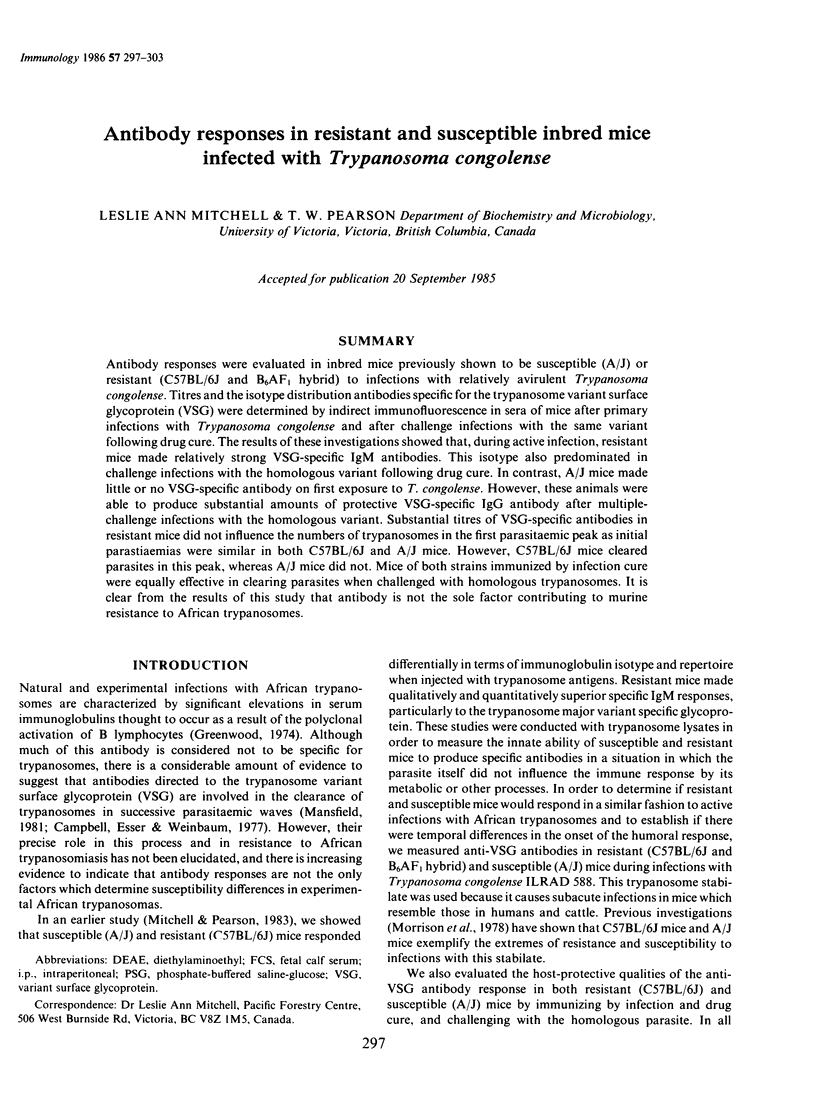
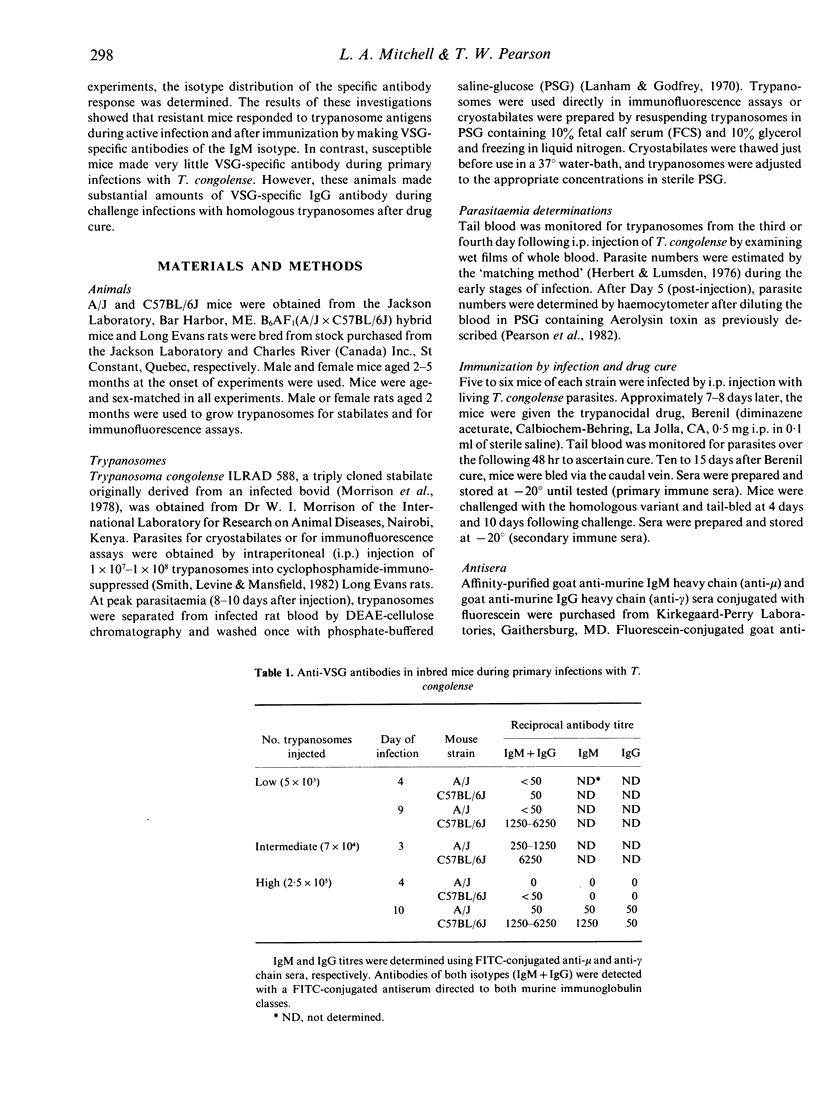
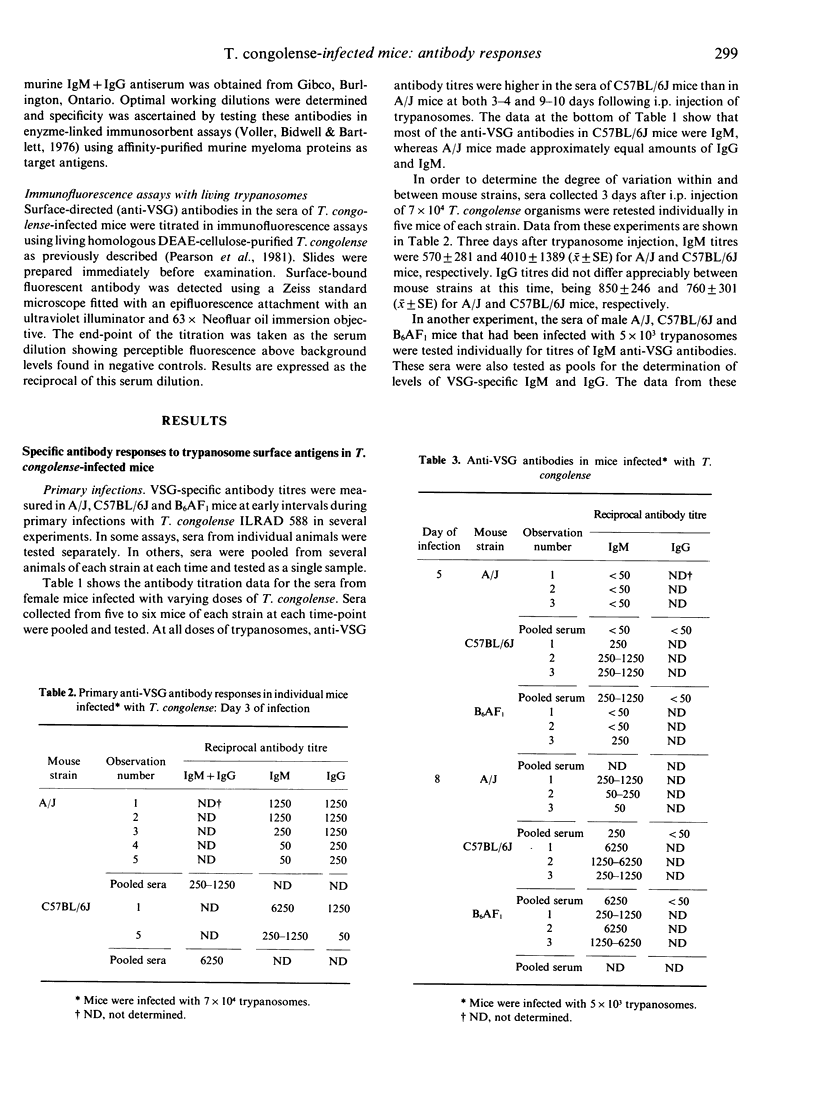
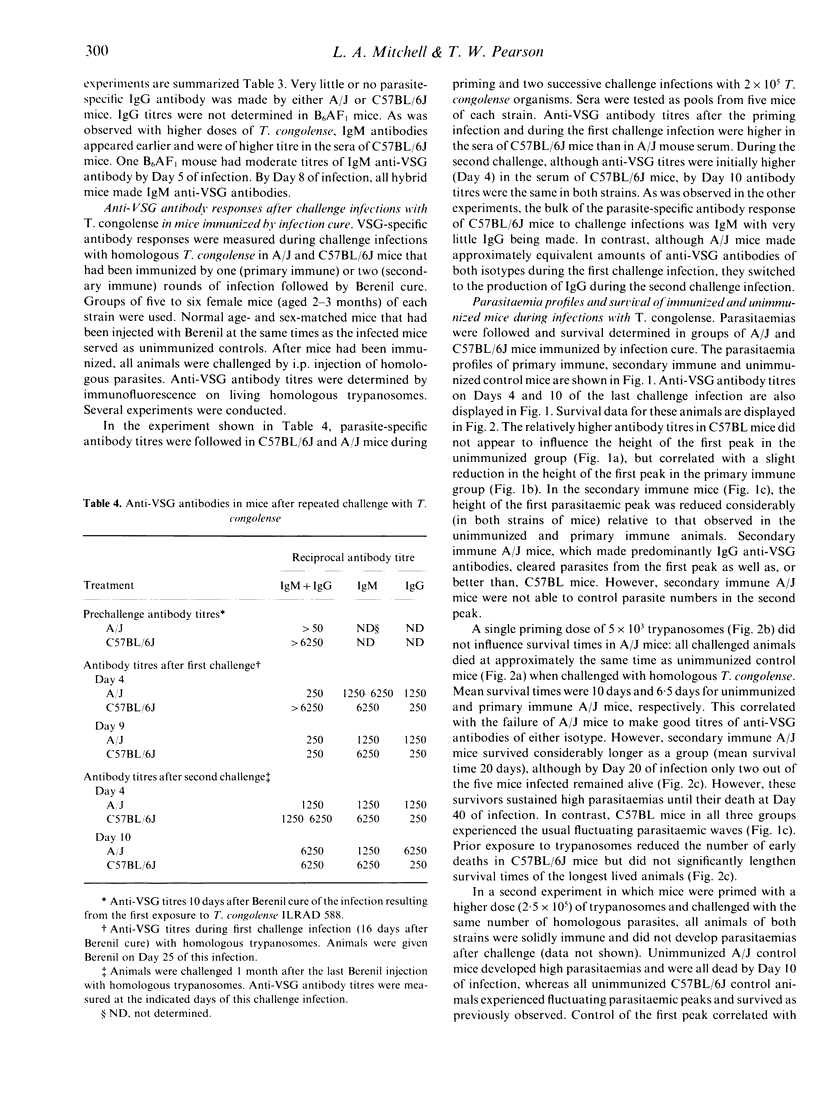
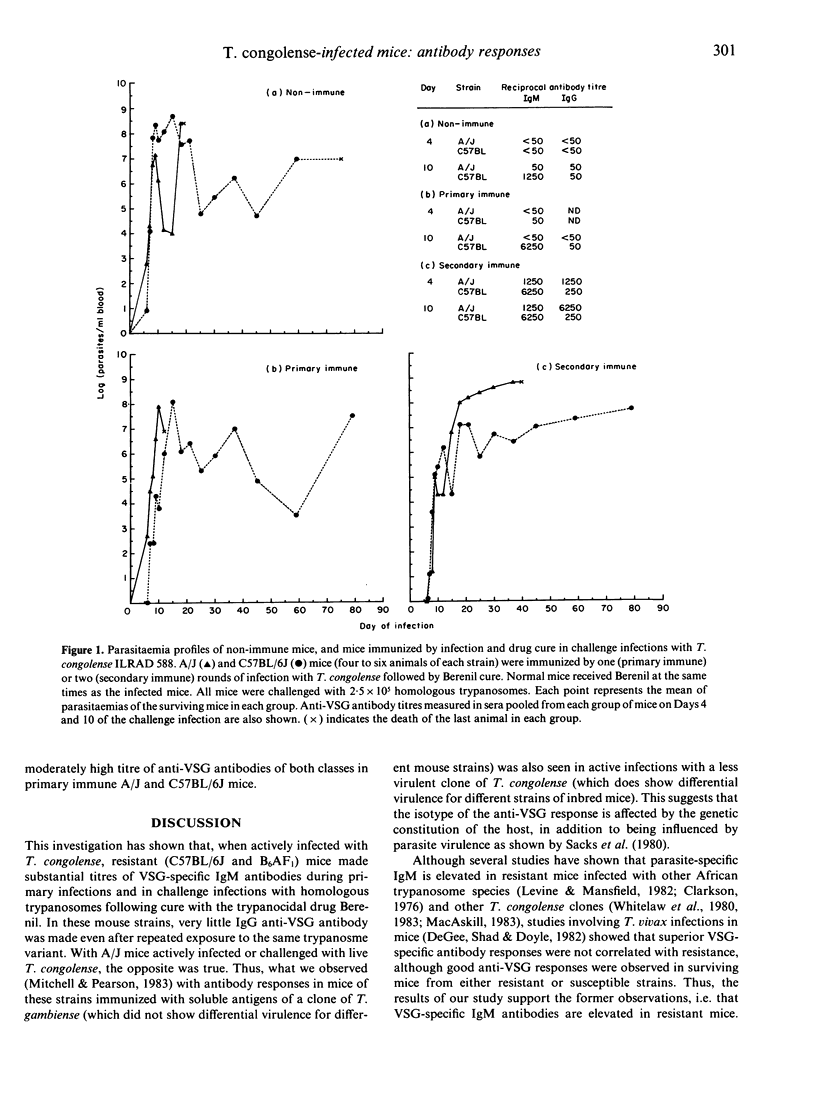
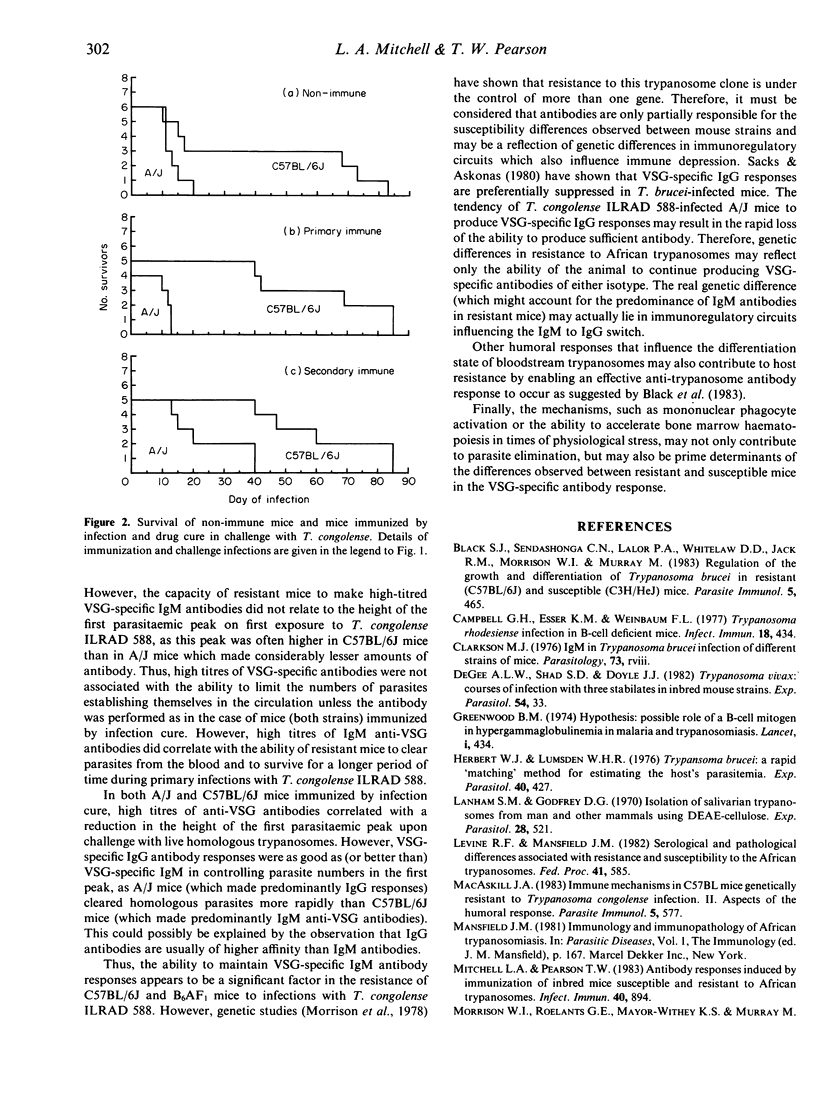
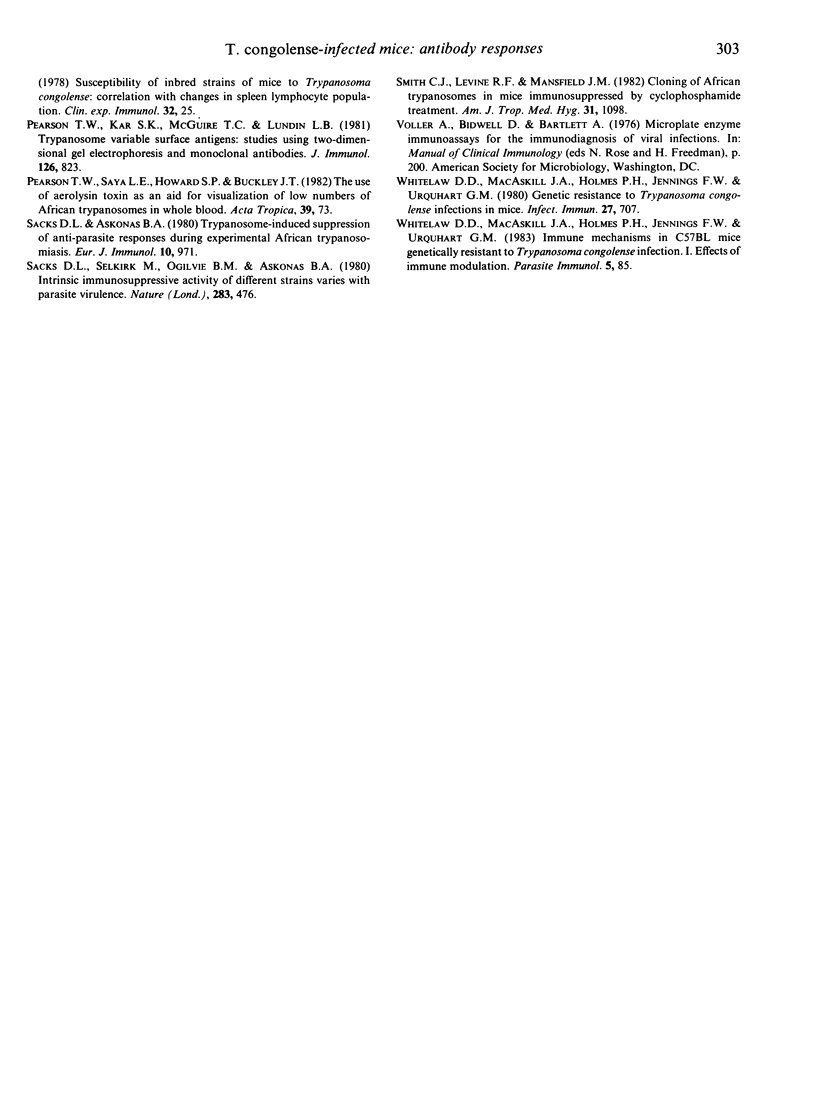
Selected References
These references are in PubMed. This may not be the complete list of references from this article.
- Black S. J., Sendashonga C. N., Lalor P. A., Whitelaw D. D., Jack R. M., Morrison W. I., Murray M. Regulation of the growth and differentiation of Trypanosoma (Trypanozoon) brucei brucei in resistant (C57Bl/6) and susceptible (C3H/He) mice. Parasite Immunol. 1983 Sep;5(5):465–478. doi: 10.1111/j.1365-3024.1983.tb00761.x. [DOI] [PubMed] [Google Scholar]
- Campbell G. H., Esser K. M., Weinbaum F. I. Trypanosoma rhodesiense infection in B-cell-deficient mice. Infect Immun. 1977 Nov;18(2):434–438. doi: 10.1128/iai.18.2.434-438.1977. [DOI] [PMC free article] [PubMed] [Google Scholar]
- Herbert W. J., Lumsden W. H. Trypanosoma brucei: a rapid "matching" method for estimating the host's parasitemia. Exp Parasitol. 1976 Dec;40(3):427–431. doi: 10.1016/0014-4894(76)90110-7. [DOI] [PubMed] [Google Scholar]
- Lanham S. M., Godfrey D. G. Isolation of salivarian trypanosomes from man and other mammals using DEAE-cellulose. Exp Parasitol. 1970 Dec;28(3):521–534. doi: 10.1016/0014-4894(70)90120-7. [DOI] [PubMed] [Google Scholar]
- MacAskill J. A., Holmes P. H., Whitelaw D. D., Jennings F. W., Urquhart G. M. Immune mechanisms in C57B1 mice genetically resistant to Trypanosoma congolense infection. II. Aspects of the humoral response. Parasite Immunol. 1983 Nov;5(6):577–586. doi: 10.1111/j.1365-3024.1983.tb00774.x. [DOI] [PubMed] [Google Scholar]
- Mitchell L. A., Pearson T. W. Antibody responses induced by immunization of inbred mice susceptible and resistant to African trypanosomes. Infect Immun. 1983 Jun;40(3):894–902. doi: 10.1128/iai.40.3.894-902.1983. [DOI] [PMC free article] [PubMed] [Google Scholar]
- Pearson T. W., Kar S. K., McGuire T. C., Lundin L. B. Trypanosome variable surface antigens: studies using two-dimensional gel electrophoresis and monoclonal antibodies. J Immunol. 1981 Mar;126(3):823–828. [PubMed] [Google Scholar]
- Sacks D. L., Askonas B. A. Trypanosome-induced suppression of anti-parasite responses during experimental African trypanosomiasis. Eur J Immunol. 1980 Dec;10(12):971–974. doi: 10.1002/eji.1830101216. [DOI] [PubMed] [Google Scholar]
- Sacks D. L., Selkirk M., Ogilvie B. M., Askonas B. A. Intrinsic immunosuppressive activity of different trypanosome strains varies with parasite virulence. Nature. 1980 Jan 31;283(5746):476–478. doi: 10.1038/283476a0. [DOI] [PubMed] [Google Scholar]
- Smith C. J., Levine R. F., Mansfield J. M. Cloning of African trypanosomes in mice immunosuppressed by cyclophosphamide treatment. Am J Trop Med Hyg. 1982 Nov;31(6):1098–1102. doi: 10.4269/ajtmh.1982.31.1098. [DOI] [PubMed] [Google Scholar]
- Whitelaw D. D., MacAskill J. A., Holmes P. H., Jennings F. W., Urquhart G. M. Immune mechanisms in C57Bl mice genetically resistant to Trypanosoma congolense infection. I. Effects of immune modulation. Parasite Immunol. 1983 Jan;5(1):85–94. doi: 10.1111/j.1365-3024.1983.tb00726.x. [DOI] [PubMed] [Google Scholar]
- Whitelaw D. D., Macaskill J. A., Holmes P. H., Jennings F. W., Urquhart G. M. Genetic resistance to Trypanosoma congolense infections in mice. Infect Immun. 1980 Mar;27(3):707–713. doi: 10.1128/iai.27.3.707-713.1980. [DOI] [PMC free article] [PubMed] [Google Scholar]
- de Gee A. L., Shah S. D., Doyle J. J. Trypanosoma vivax: courses of infection with three stabilates in inbred mouse strains. Exp Parasitol. 1982 Aug;54(1):33–39. doi: 10.1016/0014-4894(82)90107-2. [DOI] [PubMed] [Google Scholar]


